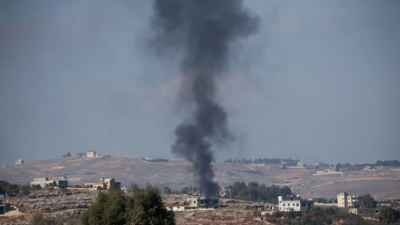
Hezbollah on Monday fired towards Israeli-controlled territory, breaking the recently established cease-fire, which led to Israel conducting extensive airstrikes in Lebanon. Both parties accused each other of breaching the fragile peace agreement.
The Israeli forces reported that two Hezbollah projectiles landed in uninhabited areas without casualties in Shebaa Farms (known to Israelis as Mount Dov), a territory captured by Israel in 1967 but disputed by both nations.
Hezbollah justified their actions as a “defensive response” and “warning” against what they termed “repeated violations of the agreement by the Israeli enemy.”
The Israeli military retaliated with widespread bombardments across Lebanon, targeting numerous missile launch sites. According to the Lebanese health ministry, the Israeli strikes resulted in at least 10 fatalities and three injuries on Monday, with no distinction made between civilian and military casualties.
Despite regular Israeli bombardments targeting alleged Hezbollah militants since the US and France-mediated agreement, the cease-fire has largely remained intact, ending over a year of conflict.
The agreement has proven relatively successful thus far. Neither side shows interest in resuming hostilities that resulted in nearly 4,000 Lebanese and 100 Israeli deaths, displaced over one million Lebanese, and left Israeli border regions deserted.
Israel faces a strategic challenge. While hoping to maintain the truce to concentrate on Gaza Strip operations and Iran-related concerns, they worry about Hezbollah potentially rebuilding their border presence, violating agreement terms.
Israeli politicians advocated for strong retaliation to Hezbollah’s actions on Monday, viewing it as crucial for establishing deterrence. Prime Minister Benjamin Netanyahu described it as “a severe violation” while indicating Israel’s commitment to the cease-fire.
The agreement stipulates that Israel must stop “offensive military operations against Lebanese targets” and gradually remove troops from southern Lebanon within 60 days. Hezbollah must withdraw northward, allowing Lebanese military deployment along the border.
Israeli leadership maintains they will militarily enforce the agreement to prevent Hezbollah’s border presence reconstruction, arguing that overlooking minor violations could encourage further breaches.
Herzi Halevi, Israeli military chief of staff, said on Monday, “We will respond decisively to Hezbollah’s severe violation of the cease-fire, and will continue to do so. We have plans and targets ready to be carried out and at any given moment.”



















